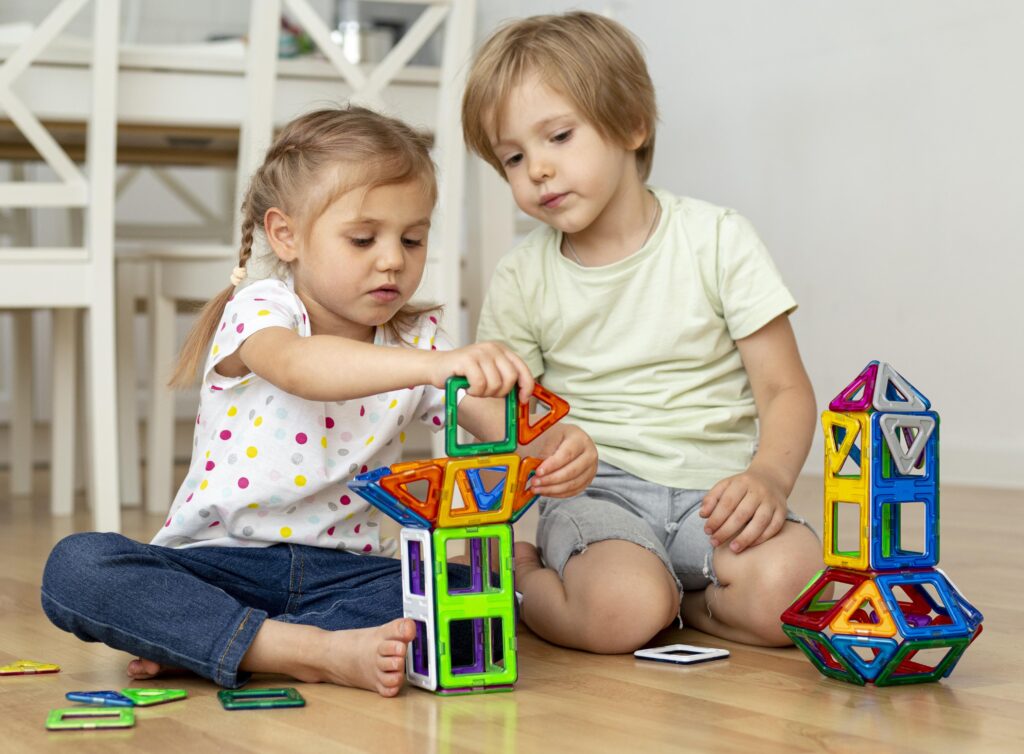
Why Bonding Through Toys Matters
Children mayWhy Bonding Through Toys Matters
Children may not always express their feelings through words, but they do express a lot through play. Play is their language. When parents or caregivers actively join in, they enter the child’s world and show that they care, listen, and understand.
Research in child psychology has shown that children who share regular playtime with their parents:
- Feel more secure and confident
- Have better communication skills
- Build stronger emotional intelligence
- Form lifelong memories with positive associations
🧩 The Power of Shared Play
When adults play with children, it sends a simple but powerful message:
“You are important. Your thoughts, your fun, your imagination matters.”
Whether it’s a game of pretend cooking, building a LEGO house together, or racing cars across the living room, shared play helps build:
- Trust: Your child feels safe and heard.
- Empathy: You begin to understand their likes, fears, and emotions.
- Teamwork: You solve problems and complete tasks together.
- Joy: Laughter and smiles naturally strengthen emotional ties.
🤗 Emotional Benefits for Both Child and Parent
Let’s take a closer look at how toy time benefits both:
For Children:
- Validation: When you join their play, they feel valued.
- Communication: They learn to share ideas and express emotions.
- Security: Regular interaction builds a strong sense of emotional safety.
- Memory Making: These moments become part of their childhood story.
For Parents:
- Understanding: You get to know your child’s personality better.
- Stress Relief: Laughing and playing acts as a break from adult stress.
- Connection: You feel more emotionally connected to your child.
- Joy of Presence: You cherish the present moment, away from distractions.
👨👩👧 Types of Toy Play That Strengthen Bonds
Not all toys work the same way when it comes to bonding. Here are some types of toys and how they help:
🧱 1. Building Toys (Blocks, LEGO, Magnetic Tiles)
- Encourage teamwork and shared creativity.
- Boost communication as you decide what to build.
- Offer the joy of “creating something together.”
🎭 2. Pretend Play Sets (Kitchen sets, Doctor Kits, Dollhouses)
- Let you step into your child’s imaginative world.
- Help role-play real-life situations and emotions.
- Develop empathy and storytelling skills.
🎨 3. Art & Craft Toys
- Give space for calm, creative moments.
- Allow for emotional expression through colors and drawings.
- Provide a relaxed space for casual conversations.
🎲 4. Board Games & Puzzles
- Teach patience, turn-taking, and strategy.
- Offer a fun, competitive bonding experience.
- Encourage logical thinking and shared achievement.
⚽ 5. Outdoor & Physical Toys (Balls, Cycles, Kites)
- Promote healthy physical bonding.
- Let children see parents in fun, playful roles.
- Create energetic, laughter-filled memories.
⏰ Making Time for Toy Time: Even 15 Minutes Matter
Many parents feel guilty thinking they don’t have “enough” time to play. But truthfully, even 15-20 minutes of focused, distraction-free play every day can make a huge difference.
Here are some tips:
- Be present: Put away phones or work during playtime.
- Let your child lead: Allow them to choose the toy or activity.
- Avoid teaching mode: Just enjoy the process instead of correcting them.
- Celebrate little moments: Laugh together, appreciate their creativity.
🧘♂️ What If You’re Not a “Playful” Person?
Some adults struggle with pretend play or get bored easily. That’s okay!
Try the following:
- Pick toys YOU enjoy too—like puzzles, drawing, or building.
- Let your child teach you the game—it empowers them and relaxes you.
- Focus on interaction more than performance.
- Remember, it’s the connection, not the game, that matters most.
🌱 Long-Term Impact: Bonds That Grow with Time
Children who grow up feeling emotionally connected to their parents through shared play are more likely to:
- Be open about their feelings as teens
- Have higher self-esteem
- Show compassion and patience with others
- Form better relationships later in life
Playtime today can become the foundation of lifelong trust and open communication.
💬 Final Thoughts
In a world full of noise and screens, toy time offers a quiet yet powerful way to connect with your child. It’s not about the toy itself—it’s about the moments created, the laughs shared, and the love communicated through every playful gesture.
So the next time your child hands you a toy and says, “Come play with me,” don’t hesitate. That small invitation could be the beginning of a big memory.
Because at the heart of every strong relationship is one simple thing: time spent together—with love, laughter, and play. 🎈
not always express their feelings through words, but they do express a lot through play. Play is their language. When parents or caregivers actively join in, they enter the child’s world and show that they care, listen, and understand.
Research in child psychology has shown that children who share regular playtime with their parents:
- Feel more secure and confident
- Have better communication skills
- Build stronger emotional intelligence
- Form lifelong memories with positive associations
